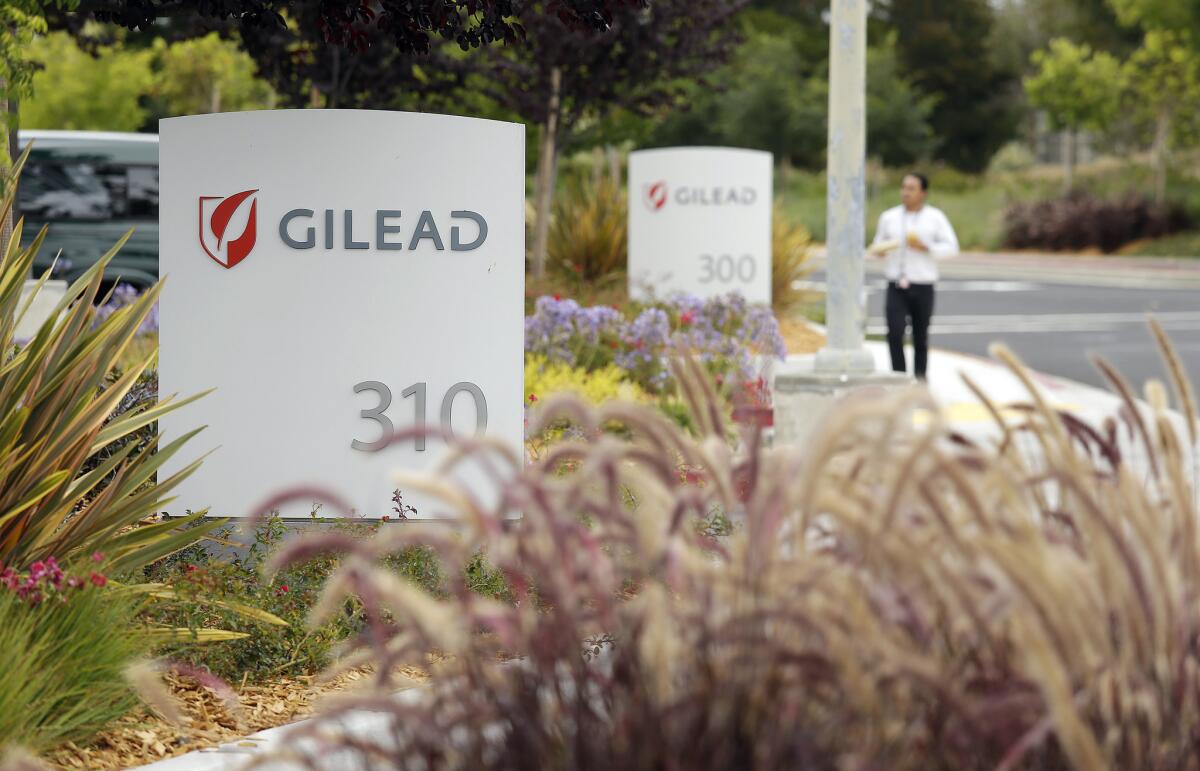Gilead owes Merck $200 million in damages over drug patents, jury finds

Gilead Sciences’ two hepatitis drugs accounted for nearly two-thirds of its sales in 2015. Above, the headquarters of Gilead Sciences in Foster City, Calif.
The federal jury in a patent trial has ordered drugmaker Gilead Sciences Inc. to pay Merck & Co. $200 million in damages for infringing on patents for hepatitis C drugs.
The award is far below the damages Merck sought, but the trial moves to a new phase Wednesday. The jury, in San Jose, then will decide whether Merck is due royalties on sales of Gilead’s hepatitis C drugs, Harvoni and Sovaldi.
Merck, which recently launched a hepatitis C drug called Zepatier, claims two patents that Merck and partner Ionis Pharmaceuticals Inc. filed in 2002 were the basis for Gilead’s sofosbuvir. That’s the active ingredient in Sovaldi and part of combination drug Harvoni, which are among the world’s top-grossing medicine franchises.
The two Gilead drugs had 2015 worldwide sales of $19.1 billion, mostly in the U.S. That’s nearly two-thirds of all revenue for Gilead, a biologic drugmaker based in Foster City, Calif.
Merck, which is based in Kenilworth, N.J., sought damages amounting to 10% of U.S. sales of Harvoni and Sovaldi through the end of 2015, which totaled $23.1 billion. It’s also seeking royalties of 10% of the U.S. sales of the two drugs starting Jan. 1.
Gilead said that if a judge upholds the $200-million award the jury ordered Thursday night, it will appeal.
See more of our top stories on Facebook >>
“Since Merck made no contribution and assumed none of the risk in the discovery and development of sofosbuvir, we do not believe Merck is entitled to any amount of damages. We continue to believe the Merck patents are invalid,” Gilead said.
However, the federal judge overseeing the case ruled a month ago that Gilead’s two medicines did infringe on the patents. Then on Tuesday, the jury upheld the validity of the two patents, which Merck and Carlsbad, Calif.-based Ionis Pharmaceuticals filed in 2002 for “compounds and methods” to treat patients infected with the hepatitis C virus.
Merck claimed that Pharmasset, a company Gilead bought for $11 billion in 2011 to gain the rights to then-experimental drug sofosbuvir, used information in the 2002 patents to develop sofosbuvir. Merck said it, Ionis and their partners spent years and significant money working on the patents.
Gilead denies any patent infringement, saying Pharmasset began working on sofosbuvir’s development in 2001.
According to Merck, Gilead initiated the litigation by seeking a declaratory judgment that the Merck and Ionis patents were invalid.
“The jury’s verdict upholds patent protections that are essential to the development of new medical treatments,” Merck said late Thursday.
Patents guarantee drugmakers exclusive sales for a decade or more, before generic competition is allowed, so the companies can recoup their investment and use profits to then develop new medicines.
Merck won U.S. approval on Jan. 28 for Zepatier, and priced it well under Harvoni’s list price of $94,000 per treatment course. That set up a battle for favorable formulary positions, and thus more sales, from insurers and prescription benefit managers.
Merck was one of two dominant makers of hepatitis C treatments until Gilead’s drugs were approved. Those drugs, as well as Merck’s Zepatier and new ones from a few other rivals, have revolutionized treatment for hepatitis C. About 3 million Americans have the liver-destroying, blood-borne virus.
Previous generations of hepatitis C medicines required a year of treatment and caused flu-like and other side effects, yet barely cured half of patients. The new drugs cure about 95% of patients in eight to 12 weeks, but their high prices have strained the budgets of insurers and government health programs.
MORE FROM BUSINESS
Aldi opens in the Southland: What you need to know
FAA predicts that 4.3 million hobbyist drones will be sold by 2020
Microsoft kills ‘inappropriate’ AI chatbot that learned too much online
More to Read
Inside the business of entertainment
The Wide Shot brings you news, analysis and insights on everything from streaming wars to production — and what it all means for the future.
You may occasionally receive promotional content from the Los Angeles Times.










